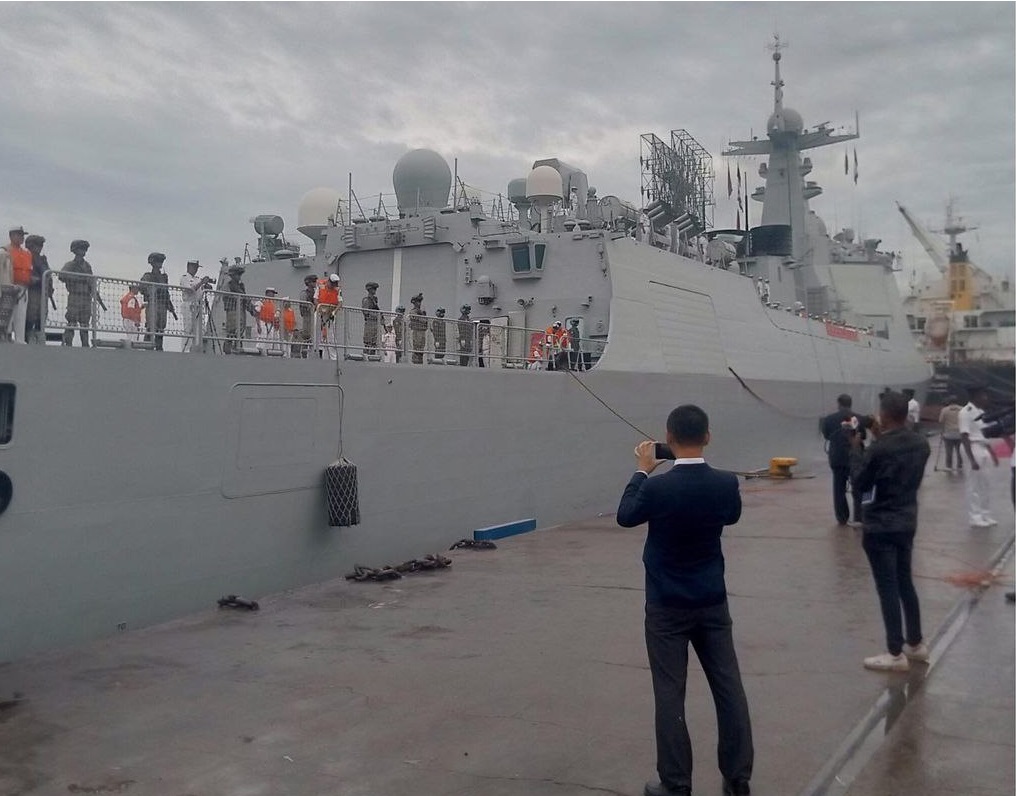Latest
Chinese warship in Nigeria/Gulf of Guinea: Not mere port call
Published
3 years agoon

On the surface, it would have been okay to just take wholeheartedly the explanation given by both the Nigerian and Chinese authourities in Lagos for the Chinese military rare landing on the West African coast but for the obvious blurred ‘Ahoy’ and the known fact that in diplomatic practice there’s usually the “stated” and then the “latent” objective.
As widely reported, a naval fleet of the People’s Liberation Army (PLA) led by the warship Nanning arrived on Sunday 2nd of July in Nigeria for a rare visit by the Chinese military to Africa’s Atlantic coast.
The destroyer and an accompanying frigate, Sanya, along with a supply ship, Weishanhu, arrived off the port of Lagos, with Nanning berthing for a port call as said by the Nigerian Navy in a statement.
Whether they want to hear this or not, the Chinese navy making a port call in Nigeria this week in a rare visit to West Africa where Beijing has been seeking to expand its influence, should be taken more seriously than what our officials want us to believe.
Though the Nigerian Navy and Chinese Embassy on Monday July 4 2023, said the five-day visit signified growing relations between Beijing and Africa, with the goal of tackling maritime security threats and maintaining stability in the Gulf of Guinea, the visit comes amid speculation that Beijing could be seeking to establish a military/naval base in the Gulf of Guinea.
Three warships of China’s People’s Liberation Army fleet arriving Nigeria’s economic hub, Lagos, bringing about 700 soldiers/sailors is more than a casual courtesy call whether they agree or not.
The Gulf of Guinea is where the concern lies and the power tussle between China and United States is the main issue here.
China has been investing heavily in infrastructure in Africa, including Nigeria, for many years and Nigeria is one of China’s top crude oil suppliers.
As said by an expert “China has the intention of establishing a military base in West Africa similar to the Africa Partnership Station (APS), led by the U.S. Navy under the aegis of the U.S. Africa Command (AFRICOM) and this awkward visit may be a move by China to convince Nigeria to support that desire.”
Last year, U.S. defence officials said they were worried that such a base could threaten U.S. national security. The question is: U.S. national security in their country or in West Africa?
And this is where the real issue lies: escalating tension in the gulf by over-militarising the region. This has dire consequences and the implications of these two opposing superpowers having military bases in the Gulf of Guinea have to be taken seriously. This is in addition to the covert Russian (business) interest on the eastern flank of the Gulf of Guinea at the Opobo Channel axis.
A good percentage of the oil imported into the West and even East (China) come from the Gulf of Guinea. Nigeria, Equatorial Guinea, Gabon, Angola and Katanga province of DR Congo are all oil producing. Cameroon in addition to its marginal production serves as the most critical terminus of a pipeline that drains oil from Chad.
The region, mostly Angola and Nigeria, is among China’s top oil suppliers. Major Chinese oil explorer CNOOC Ltd also engages in deep-sea production off the coast of Nigeria (in the same Gulf of Guinea).
In January, Nigeria opened a billion-dollar Chinese-built deep seaport in Lagos. The new Lekki deep seaport, one of the region’s biggest, is 75 percent-owned by state-owned China Harbour Engineering Co. and the Singapore-based Tolaram group. Last month, the Lekki Deep Sea Port berthed a 300-meter-long vessel from China, the largest since the port was launched.
There has also been speculation that the Gulf of Guinea could offer a base for China’s military possibly in Equatorial Guinea.
In 2017, China opened its first overseas naval base in Djibouti, one of the world’s most important choke points for maritime trade, fanning concern that Beijing might set up more regional “logistics facilities” as its military develops the capacity to operate thousands of kilometres from home.
ALSO READ: China warships visit Nigeria
Over the last three decades, China has widened its influence in almost every African nation through investment, trade, and loans.
In 2016, the cash-strapped island nation of Sao Tome and Principe in the Gulf established relations with Beijing after cutting ties with democratically governed Taiwan, which China claims as part of its territory. Sao Tome is located in the heart of the Gulf of Guinea, making it a potential hub for oil and gas production.
As said in an agency report, “Beijing is definitely interested in expanding its influence in Africa to protect its assets; it has invested massively in African countries pre-COVID, during COVID and post-COVID. It will definitely want to protect those investments and one of the ways it can do that is to strengthen security ties with African countries.”
The Gulf of Guinea – a major shipping route stretching 5,700 kilometres (over 3,500 miles) from Senegal to Angola – has long been at risk from piracy with international criminal gangs carrying out most attacks on foreign shipping vessels. Nigeria remains at the epicentre of the current wave of piracy in the Gulf of Guinea.
So the arrival of Chinese naval fleet in Nigeria comes amid speculation that the Gulf of Guinea could offer a base for Beijing. But this is just one side of the story.
The other side of the story is that this development portend serious danger to the Gulf cooperation states as the real intention may be something the Chinese are not telling the states now particularly Nigeria.
With all the investments listed above some directly by Chinese interests others through Chinese loans, the Asian giant would not want to leave anything to chance in safeguarding their investment interests in the gulf region.
Using the Chinese antecedents in Zambia, Tanzania and some other African countries where the Asian superpower has taken over critical infrastructures in those countries under the guise of running them to recover their loans, the Nigerian and other Gulf of Guinea State governments should know that the Chinese are up to something that’s beyond curbing of piracy and other security issues in the region.
The question is: are we ready to hand over some of these critical economic infrastructures to the Chinese or we watch them take it by coercive force because that’s where all these muscle flexing is going to end.
Another area that should be of concern to our leaders is sheepishly allowing China and the United States shift their supremacy battle ground to the Gulf of Guinea. The two bulldogs barking at each other in our backyard is definitely not going to be pleasant for our welfare and wellbeing as a nation especially with the kind of people we have in the governments of the gulf states. Mark my word!
(IFEANYI IZEZE writes from Abuja and can be reached on: [email protected]; 234-8033043009)
You may like


Nigeria Declares Readiness to Host 2030 Commonwealth Games


BREAKING: The Head of Service of the Federal Capital Territory (FCT), Grace Adayilo is dead


Nigeria, Switzerland begin talks on artefact repatriation and cultural cooperation


El-Rufai rules out 2027 ambition, Says He’s back to mentor youth, Support credible leadership


NMDPRA – Nigerians spend N1.3tn on petrol in June amid soaring energy costs


Pastor Adefarasin: Nigeria was born of British greed, Not God’s design
Trending

 Entertainment6 days ago
Entertainment6 days agoSimi addresses resurfaced 2012 tweets amid online backlash

 Health1 week ago
Health1 week agoSCFN, LUTH introduce bone marrow transplants as curative treatment for sickle cell

 Health4 days ago
Health4 days agoDeclassified CIA memo explored concealing mind-control drugs in vaccines

 Football1 week ago
Football1 week agoHarry Kane nets brace as Bayern edge Frankfurt 3–2 to go nine points clear

 Football1 week ago
Football1 week agoLate Flemming header stuns Chelsea as Burnley snatch 1–1 draw at Stamford Bridge

 Crime4 days ago
Crime4 days agoSenior police officers faces retirement after Disu’s appointment as acting IGP

 Education6 days ago
Education6 days agoPeter Obi urges JAMB to address registration challenges ahead of exams

 Crime1 week ago
Crime1 week agoTwo killed, seven injured in early-morning shooting in Richmond’s Shockoe Bottom

